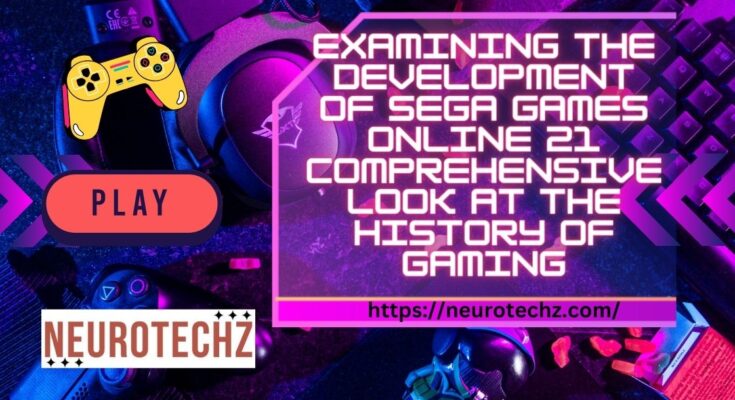Sega Games Online has established itself in the ever-changing online gaming market for decades
Sega has been instrumental in reshaping the gaming industry, from its modest origins in the arcade period to its success in the home console market. By examining the company’s history, renowned franchises, and influence on the gaming world, we will explore Sega Games Online’s development in this in-depth piece.
The Genesis of Sega: A Historical Overview
Investigating Sega Games Online early history is crucial to appreciating the company’s influence on the video game industry. The company’s earlier endeavours, its arcade scene breakthroughs, and the critical junctures that resulted in the development of legendary franchises like Sonic the Hedgehog will all be covered.
Birth of Sega and Arcade Dominance
In the 1940s, Standard Games was established in Hawaii, marking the beginning of Sega’s history. In the 1960s, the firm changed its name to Sega Games Online after undergoing several changes. Sega gained notoriety in the 1970s arcade boom with titles like Pong-Tron and Periscope, solidifying their position in the gameplay market.
Sega Master System and the Console Wars
Sega’s home console debut, the Sega Master System, occurred during the 8-bit period. Despite fierce opposition from Nintendo’s NES, Sega Games Online began laying the groundwork for the iconic “console wars” that would define much of the gaming scene in the future.
Sonic the Hedgehog and the 16-Bit Revolution
One must delve into Sonic the Hedgehog’s influence to discuss Sega Games Online legacy. Along with boosting Sega’s success, Sonic’s arrival in the early 1990s heightened animosity between it and Nintendo. The development of Sonic, the 16-bit era, and the advancements that characterized this time will all be covered.
Sonic’s Genesis: The Birth of a Mascot
A pioneering figure, Sonic the Hedgehog served as Sega Games Online spokesperson. We will examine Sonic’s conception, his design philosophies, and how he overthrew Mario as the dominant character in popular culture.
Sega Genesis vs. Super Nintendo: The Console Wars Intensify
16-bit gaming was the height of Sega Games Online and Nintendo’s rivalry. We will examine the popular games, technological innovations, and marketing tactics that drove the fierce rivalry between the Sega Genesis and the Super Nintendo Entertainment System (SNES).
The Transition to 3D and Sega Saturn
Sega encountered new possibilities and obstacles as the gaming industry moved toward three-dimensional graphics. Even though it was a commercial failure, the Sega Saturn brought advancements that would influence gaming. The highs and lows of the Sega Games Online Saturn era will be discussed, along with the introduction of innovative games and the mistakes that contributed to its commercial difficulties.
Sega Saturn’s Technological Ambitions
The Sega Games Online Saturn sought to redefine the gaming experience by utilizing cutting-edge electronics. We’ll explore the detailed features, the advent of CD-ROM technology, and the large-scale initiatives demonstrating the console’s capabilities.
Sonic’s Transition to 3D Sonic Adventure and Beyond
As gaming shifted to 3D, the Sonic franchise saw a dramatic metamorphosis. We will look at Sonic Adventure’s influence, the first 3D Sonic game, and other games that dealt with the difficulties of bringing a well-liked 2D character into a 3D setting.
Dreamcast and the Rise of Online Gaming
Despite being the company’s final hardware release, the Sega Dreamcast profoundly impacted the video game industry. We’ll go through the unique characteristics of Dreamcast, its game selection, and the revolutionary debut of online gaming via the Sega Games OnlineNet service.

Dreamcast’s Technological Innovations
Regarding technologies like built-in modems, internet access, and innovative VMUs (Visual Memory Units), the Dreamcast was ahead of its time. We will discuss the Dreamcast’s unique technological features and how they affected later console generations.
SegaNet: Pioneering Online Gaming
SegaNet signalled the company’s entry into online gaming by enabling Dreamcast users to connect and play games online. We’ll look at SegaNet’s struggles and triumphs, selection of games, and impact on the development of online multiplayer gaming in the future.
Sega’s Transition to Software Development
Sega became a third-party publisher focused on software development when Dreamcast was discontinued. We will examine how Sega Games Online changed, how it collaborated with other platforms, and how famous franchises altered in the new millennium.
Sega’s Third-Party Endeavors
Opening up additional channels for the business was Sega’s choice to become a third-party publisher. This article will examine Sega Games Online collaborations with various gaming platforms, the introduction of cross-platform games, and the effects of this tactical change on the gaming market.
Iconic Franchises in the Modern Era
With the revival of beloved franchises and the development of new ones, Sega’s influence can still be seen in the contemporary gaming world. In this section, we’ll examine the development of well-known Sega properties, such as Persona, Yakuza, and Sonic the Hedgehog, and how fans still find them appealing.
Sega Games Online in the 21st Century
Growing its online presence has allowed Sega to better respond to evolving gaming trends in the era of digital connectivity. We will discuss Sega’s online endeavours, encompassing mobile gaming, digital distribution channels, and the ongoing influence of its iconic franchises on the web.
Digital Distribution Platforms
Because Sega embraces digital distribution channels, a worldwide audience can now play its games. We’ll examine Sega’s digital strategy and its advantages to players and the firm as we explore its presence on networks like Steam, Xbox Live, and PlayStation Network.
Mobile Gaming: Sega’s Success in the Palm of Your Hand
There are now more opportunities for gaming due to the widespread use of mobile devices, and Sega Games Online has successfully entered this sector. We will discuss popular games, collaborations, and the effect of mobile gaming on Sega Games Online’s overall business performance as we examine the company’s mobile gaming activities.
The Future of Sega Games Online
With the game industry constantly changing, Sega will likely continue to grow and adapt. We will make predictions regarding possible developments, the future of Sega Games Online, and Sega’s potential influence on the next generation of video games.
Sega’s Potential Return to Hardware
There’s always talk about a potential Sega Games Online hardware return, even though the company has prospered as a software producer and independent publisher. We’ll discuss the many outcomes, difficulties, and possible effects on the gaming sector of such a change.
Sonic and Beyond Navigating the Future
What’s next for this legendary character and other beloved franchises? The Sonic franchise is still a significant part of Sega’s brand. We’ll discuss possible Sonic routes and investigate how Sega Games Online may innovate further without compromising its rich history in video games.
The Golden Age of Sega
Sega experienced great success in the late 1980s and early 1990s when the Sega Genesis and Sega Master System, two of the company’s most famous game consoles, were released. Childhoods across the globe were shaped by video games like Streets of Rage, Golden Axe, and Sonic the Hedgehog, which went on to become cultural icons. These games’ enduring appeal was aided by their addictive plots, endearing characters, and straightforward gameplay.
The Evolution of Gameplay
Simple but challenging gameplay was a hallmark of early old Sega games. Classic Sega games frequently had simple mechanics that made them easy for players to pick up and play without requiring a significant learning curve, in contrast to the intricate controls of contemporary games. A gaming experience that appealed to players of all ages was produced by this accessibility, along with the excitement of conquering more challenging levels.
Iconic Characters and Storytelling
Characters that became recognizable and associated with the Sega brand were one of the game’s distinguishing qualities. Characters like Alex Kidd, Streets of Rage’s Axel Stone, and Sonic the Hedgehog are just a handful that had a significant influence on gaming culture. The gaming experience was enhanced emotionally by these characters, who were aesthetically striking and possessed personalities that connected with players.

The Influence of Sega Arcades
With a significant presence in the arcade industry, Sega’s influence went beyond home consoles. Enthralling gamers in arcades across the globe were games like Out Run, Space Harrier, and After Burner, which offered immersive experiences. Sega made a name for itself in the gaming industry by switching from arcade hits to consoles for homes.
Preserving the Legacy
Preservation and playback of vintage old Sega games grow more challenging as technology develops. Classic games are accessible to new generations of gamers through emulators and re-releases on contemporary systems. In keeping with the spirit of the original experience, the Sega Genesis Mini, for example, offers modern gamers a carefully chosen collection of titles.
The Retro Gaming Resurgence
Retro game fans have been actively searching and collecting vintage old Sega games and systems in recent years as interest in the genre has grown. The quality of these older games is becoming increasingly appreciated, highlighting the timeless significance of traditional gameplay and design concepts.
Embrace the Emulators
Choose a trustworthy emulator as the first step in playing Sega games on your computer. Games from bygone eras can be played on more recent devices thanks to emulators and software applications that simulate their features. Widely supported Sega systems are supported by well-known Sega emulators such as Kega Fusion, Gens, and RetroArch, offering a smooth experience.
Finding the Right ROMs
The next thing to do is look for Sega game ROMs after selecting an emulator. To play them on emulators, ROMs are digital copies of game cartridges. To avoid legal difficulties and potential malware, ensure you get your ROMs from reliable websites. You may download a sizable collection of Sega game ROMs from websites like Emuparadise and CoolROM.
Installation and Setup
It’s usually a simple process to install the emulator. Visit the emulator’s official website and follow the instructions there. Configure the emulator’s controls, graphics, and audio settings to your liking after installation. A seamless gaming experience depends on completing this step.
Legal Considerations
Notably, downloading and utilizing ROMs for games you do not own in numerous areas is prohibited. The only way to ensure you comply with copyright regulations is to download legitimate ROMs for games you own.
Discovering Sega Classics
It is time to delve into the vast world of Sega oldies after configuring your emulator and installing your ROMs. Catch up on classic games like Streets of Rage, Sonic the Hedgehog, and Phantasy Star. Relive the thrill of your beloved Sega games downloaded for PC in the comfort of your home.
Community and Support
Gamers can get more out of their Sega PC gaming experience by participating in online communities and forums. Discover undiscovered treasures suggested by other Sega fans, exchange your knowledge, and get troubleshooting advice.
Updates and Enhancements
Emulators are updated frequently to improve performance and compatibility. Update your selected emulator often to have the best possible gaming experience. Keep up with the latest releases. Enhanced graphics and extra functionality are supported by certain emulators as well.
Summary
With this in-depth analysis, we have walked you through Sega Games Online’s history, from its beginnings as an arcade to its current status as a significant participant in the digital gaming industry. Pioneering spirit, enduring brands, and a readiness to change to meet the changing demands of the gaming public have all characterized Sega’s history. Sega Games Online legacy is expected to flourish with potential opportunities for the upcoming generation of gamers.



